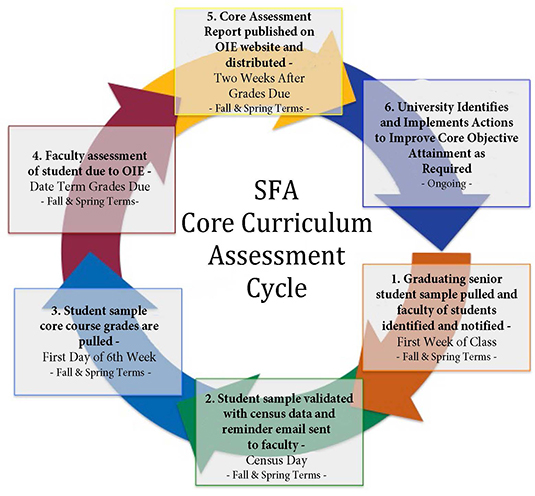
Core Objectives and the Core Curriculum
The core objectives form the foundation of SFA’s General Education Core Curriculum. When SFA assesses general education, the focus is on six Core Objectives. We do not determine the effectiveness of specific courses or components within courses; rather, we determine whether students as a whole are mastering the Core Objectives.
Each core curriculum course includes three to four of the six Core Objectives. The Core Objectives are:
Six Core Objectives
- Critical Thinking Skills
Creative thinking, innovation, inquiry and analysis, evaluation and synthesis of information - Communication Skills
Effective development, interpretation and expression of ideas through written, oral, and visual communication - Empirical and Quantitative Skills
Manipulation and analysis of numerical data or observable facts resulting in informed conclusions - Teamwork
Ability to consider different points of view and to work effectively with others to support a shared purpose or goal - Social Responsibility
Intercultural competence, knowledge of civic responsibility and the ability to engage effectively in regional, national and global communities - Personal Responsibility
Ability to connect choices, actions and consequences to ethical decision-making
Assessment of the Core Objectives - Why We Do This
The Texas Core Curriculum forms the foundation for the general education curriculum offered by Texas public institutions of higher education. Core objective assessment provides SFA an opportunity to discover, document, and seek improvements to student attainment in the six Core Objectives.
The statement of purpose says:
Collection of Data for Core Assessment - How We Collect Data
The Faculty Trust Model offers three distinct and meaningful sets of data regarding Core Objective attainment:
- Professors in upper-level, capstone courses receive a set of student names to be assessed. They are asked to assess each student's attainment of the six Core Objectives.
- Course grades from Core Component area courses are collected from these same students and compared with each corresponding Core Objective. To maintain confidentiality, only results without individual faculty and student personal identifiers will be reported and/or disseminated.
- Graduating seniors’ responses from the Core Curriculum questions embedded in the annual Senior Exit Survey are also assessed. These questions request self-evaluation in each Core Objective area, using a standard five-point Likert scale.
Core Assessment - How We Will Assess
SFA’s core assessment process allows for evaluation of the core objectives as students progress from lower-level courses through upper-level courses. A capstone course professor assesses a student in the six Core Objectives. Then, we compare that assessment rating to the Core Curriculum course grades related to each objective. Instead of the one-way communication of core reports, this plan requires discussion and professional decision making as a whole faculty using standard protocols.
Each semester, the results of the three data sets, including previous year comparisons, will be presented to faculty in an open forum. The forum will include members of the Core Curriculum Committee, as well as all relevant administration and the staff of OIE and the Office of Institutional Research. This allows for input from all interested parties, yet uses the filters of the CCC, the Deans Council, and the Provost in determining final directions. We see this data-discussion-decision approach as the positive future for Core Objective attainment at SFA.
THECB Requirement
SFA is required to submit a TCC assessment report every ten years. Texas Higher Education Coordinating Board staff review TCC assessment reports and provide feedback. It is the institution's responsibility to implement institutional changes based on the TCC assessment, if needed.
The TCC assessment report includes the following components (Texas Administrative Code, Title 19, Chapter 4, Section 4.30):
- Assessment of the Core Objectives
- Description of Assessment: for each of the six Core Objectives.
- Assessment Methods: explanations of measures, methodology, frequency and timeline of assessment activities, including representative sampling methodologies.
- Criteria/Targets: explanation of targets used to benchmark the attainment of the six Core Objectives
- Results: evidence of level of attainment targeted and achieved for each of the six Core Objectives.
- Analysis: analysis and interpretation of assessment information.
- Actions and Follow-ups: actions planned, based on assessment results, for the improvement of student learning and achievement.
- Evaluation of the Assessment Process
- Description of the strengths and weaknesses of the assessment process.
- Possible actions planned to improve the assessment process.

 Axe ’Em, Jacks!
Axe ’Em, Jacks!